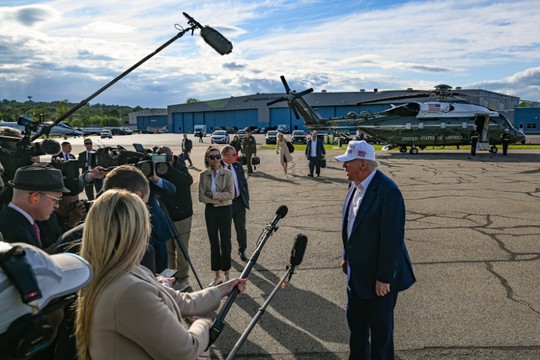Since taking office, Mr. Trump has not approved a single new military assistance package for Ukraine and has not said whether he will spend the $3.85 billion Congress has already authorized for Kyiv, writes ‘The New York Times’.
Photo: NYT
Donald Trump’s threat to withdraw US support and walk away from Russia-Ukraine peace talks has raised alarm in Kyiv, setting the stage for what Ukrainian officials and soldiers expect to turn into a Russian summer offensive that could reshape the war’s trajectory.
While Ukraine’s leaders continue their push for a 30-day ceasefire, many people are under no illusion about Russia’s years-long war winding down any time soon, Ukrainian officials and soldiers have told the ‘Financial Times’.
They argue that Russia shows no sign of scaling back its military assaults or making real concessions. A recent meeting in Turkey, they said, left Kyiv’s negotiators convinced that peace remains a distant prospect.
On Thursday, Putin announced that his forces were “creating a security buffer zone” along the Ukrainian border, a term that has been used before to signal cross-border incursions.
Washington’s oscillating support for Kyiv has only emboldened the Russian leader. After speaking at length with Putin on Monday, the US president informed Ukraine’s Zelenskyy that the two sides should settle the terms of a peace deal among themselves.
European governments, too, have been slow to act on pledges to bolster security, including a proposed “reassurance force” that has yet to materialise and some in Kyiv worry may never come to fruition.
Along Ukraine’s more than 1,000-kilometre frontline, the rhythm of war has settled into a brutal, deadly pattern. Moscow is regrouping ahead of what soldiers and analysts said is the lead-up to a new, big push in the months ahead.
European leaders are racing to come up with a plan to increase pressure on Moscow, after US President Donald Trump signalled he was inclined to leave them to sort the conflict among themselves, ‘The Financial Times’ writes.
With Washington’s commitment to Ukraine’s security seemingly waning, the French, British and German leaders are increasingly divided over how much military support can be provided to Ukraine after the war.
France and the UK, the two instigators of a so-called “coalition of the willing”, have insisted that an initial plan of deploying troops on the ground in Ukraine is still feasible.
Other nations, including Germany, are more sceptical, since the US remains opposed to the idea and has not promised the security “backstop” previously sought by European powers for such a force.
Starmer and Macron continue to back the troops proposal, people involved in the negotiations said, so as to keep Europe involved in the ceasefire talks and maintain Ukrainian morale, as well as demonstrating their commitment to Trump.
One European official said the troops plan was “dead”, since it was “preposterous without the help of Trump, and he’s not willing to provide it”.
But a French diplomat countered that the reports of the proposal’s death were “not only greatly exaggerated” but also “totally untrue”, adding that the countries were still working on the plans “at normal pace”.
read more in our Telegram-channel https://t.me/The_International_Affairs

 10:48 28.05.2025 •
10:48 28.05.2025 •























